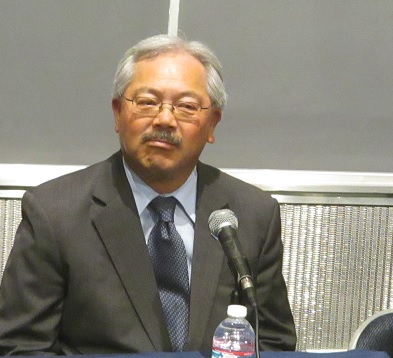The late Mayor Ed Lee called it the “jobs agenda.” When he took office, the city was coming out of the recession, and he did everything he possibly could to attract new tech companies to San Francisco.
The idea, he said, was to promote employment growth, to get the city’s unemployed people back to work. Not all of them would get high-skilled tech jobs, of course – but as the economist Enrico Moretti insisted, every new tech job created five more jobs in the service economy that would be available to lower-skilled workers.

Sups. David Chiu and Jane Kim pushed a tax break for mid-Market, aimed first at keeping Twitter in town but then at expanding the tech sector. Lee held “Tech Tuesdays,” weekly meetings with tech-industry leaders to ask them how the city could help.
Under his administration, City Hall looked the other way while Airbnb developed a business plan that required every one of its operators to violate the law; it was, the mayor said, a local tech company and the city should support it. Same for Uber and Lyft, which developed huge market valuations based on entirely illegal activity.
Randy Shaw crowed repeatedly about how Lee was going to put the city back to work, and even after the mayor died, he insisted that Lee’s focus on jobs was a key part of his legacy.
But it turns out that, as many of us warned at the time, the “jobs agenda” wasn’t quite that simple. In fact, a new study shows, attracting high tech companies with highly skilled and high-paid jobs to cities actually hurts lower-skilled workers.
That’s because the tech jobs drive up housing costs so much that while lots of service workers get employed, they can’t make enough money to afford to live in those cities.
Two economists studied the data in 182 labor markets for the period of 2009 to 2015:
It shows that high-tech industries – either STEM-intensive ‘high-tech’ or digital economy – have a positive jobs multiplier, with each 10 new high-tech jobs creating around 7 local non-tradeable service jobs, around 6 of which go to low-skilled workers. Employment rates for mid-skilled workers do not increase, but they benefit from higher wages. Yet while low-skilled workers gain from higher employment rates, the jobs are often poorly paid service work, so average wages fall, particularly when increased housing costs are considered.
In other words: Each tech job in the UK doesn’t create five more service-sector jobs; the multiplier is much lower than that. But for the less-skilled workers, the job boom that comes from tech is actually a net negative.
Richard Florida’s analysis puts it clearly:
Indeed, the researchers see “a negative and statistically significant effect from high-tech on wages for workers in the bottom third of educational attainment.” This effect is even larger when local housing costs are included, which stands in sharp contrast to the situation for higher-skill workers: Their effective wages rise when controlling for housing costs.
Michael Storper, the UCLA economic geographer, told us recently that for the richest 30 percent of the population, the cost of housing as a percentage of income has actually gone down in San Francisco. There is no housing “crisis” for the rich, just for everyone else.
That doesn’t surprise me – I have watched booms and busts in San Francisco for decades, and for most working-class people, the booms are worse than the busts. That’s because housing is the number one issue for working-class San Franciscans, and booms drive up housing costs more than they drive up wages.
The UK is clearly different from the US, and from San Francisco, but there’s a lesson here: Creating a tech boom as a way to fight unemployment was a mistake.
Most of the new skilled jobs did not go to existing unemployed San Franciscans; most went to people from out of town who moved here to take those jobs, driving up the cost of housing. Most of the spinoff jobs that were created don’t pay enough money to cover the cost of housing that was inflated by the boom, so those workers are forced out of town (or in some cases are homeless).
When politicians in the future talk about a “jobs agenda,” we need to look more seriously at the data. The boom was great for a few (particularly residential and commercial landlords) – but most people who don’t own property and lived in the city before Lee launched this agenda are worse off.





